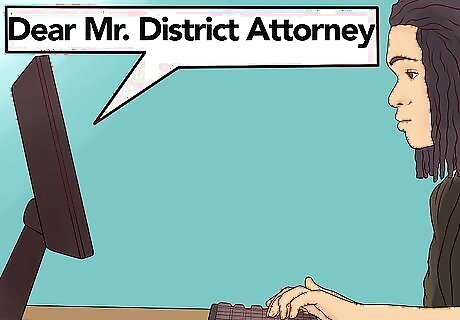
views
Addressing a Letter to a District Attorney

Research the name of the person you wish to address. If you do not already know the name of the district attorney in your jurisdiction, you can find it online by searching for the website of the "office of the district attorney" or "district attorney's office" in your area. "District attorney" is the title of the chief prosecutor of a jurisdiction within only 21 of the 50 states. Other jurisdictions may use "attorney general," "county attorney," "prosecuting attorney," "state's attorney," "state attorney," "commonwealth's attorney," "circuit attorney," "solicitor," or "district attorney general."

Write the inside address. The inside address includes the recipient's full name, title, and address. For example, "The Honorable Jane Doe, District Attorney for San Diego County, 330 W Broadway #1300, San Diego, CA 92101." "The Honorable" is used to refer to elected officials. 47 of the 50 states elect their chief prosecutors by popular election in each jurisdiction. If your jurisdiction's chief prosecutor is appointed rather than elected (Alaska, Connecticut, New Jersey, and District of Columbia), use Mr. or Ms. instead of "The Honorable."

Write the salutation. The salutation, or greeting, normally begins with "Dear." It is acceptable to begin your salutation with "Dear Mr./Madame District Attorney" or "Dear Mr./Ms. (surname)." The term "Dear" is always appropriate in a business situation and does not mean that the person is dear to you. It is simply a proper opening salutation.
Writing Your Letter

Verify that your question or concern is best addressed to the district attorney. The district attorney may not have the authority to address your concern, and may simply refer you to another office. If you are not sure to whom you should address your concern, consider telephoning the district attorney's office or contacting an attorney. If you are making unsolicited contact with the district attorney or his or her office, you may not be entitled to attorney-client privilege, and your communication may not be confidential. If you are a defendant in a criminal case and are represented by an attorney, the district attorney may be prohibited from communicating with you without your attorney's consent.

Organize your thoughts prior to writing your letter. Write down the most important points that you wish to make. Think about what the district attorney needs to hear, not just what you want to say. Imagine yourself talking to the district attorney in person in a rational manner and write it down. Be brief. Explain your situation in as few words as possible, addressing the issue and the solution you would like to see. Remember that the district attorney is likely to be very busy, and he or she will be more receptive if a letter's author is considerate of his or her time. Be professional in your language and positive in your approach. Try to keep your personal feelings out of your letter. Keep your tone formal and respectful. Do not allow casual language or slang to creep in.

Review the letter before sending it. If possible, have someone else proofread it for clarity and typographical errors.














Comments
0 comment